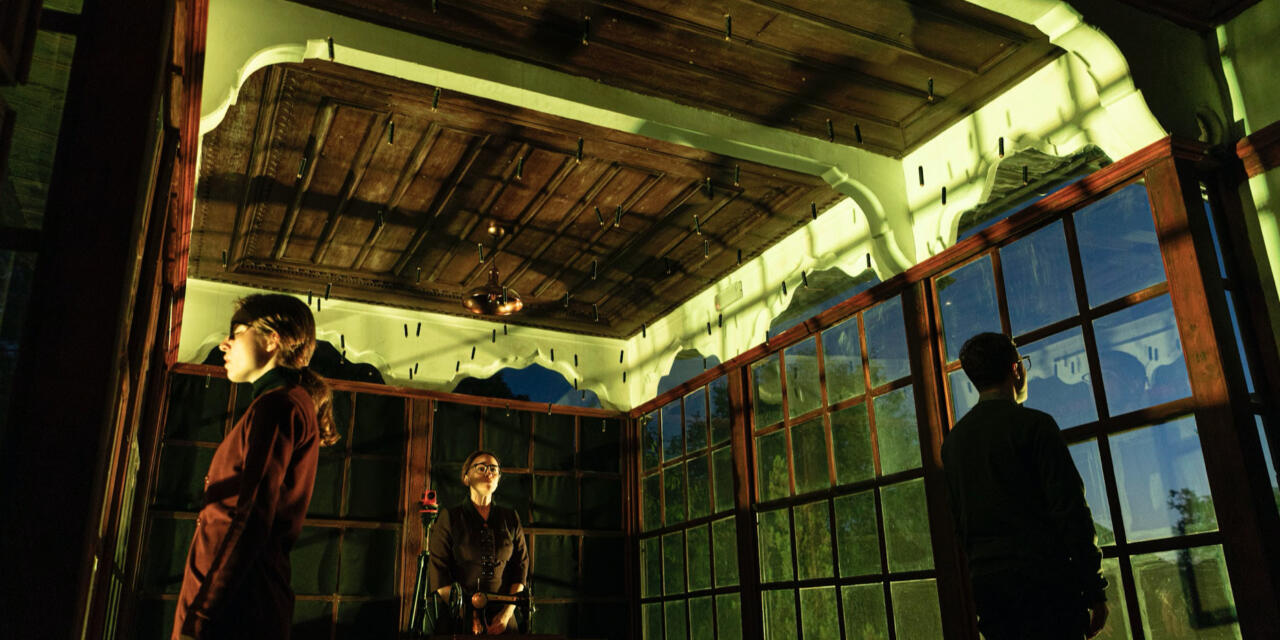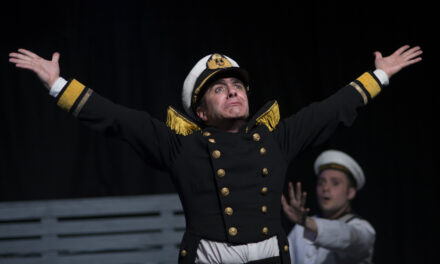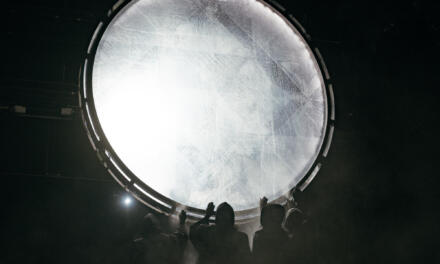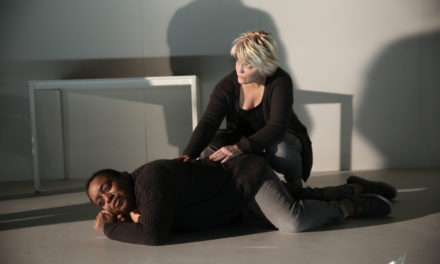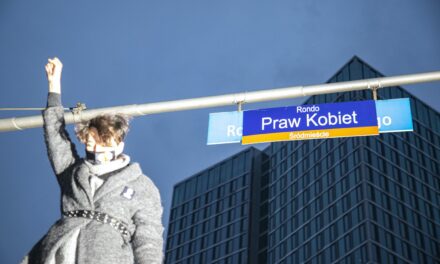“In Kosovo men are bulls**t, we are like criminals…”
Kushtrim Koliqi has been a human rights activist, theatremaker, filmmaker and producer on the Kosovo theatre scene for more than a decade. In tandem, he is also the executive director of Integra, an NGO in Prishtina, Kosovo’s capital, which deals with transitional justice issues. Transitional justice is in response to Kosovo’s war for independence in 1999 and deals with the post-war trauma that has left its mark on communities and war victims on both sides of the conflict. However, Integra is increasingly struggling with Kosovo’s patriarchal society and communist legacies left over from the former Yugoslavian rule. Previous projects that Integra have been involved in have been Peoples and Memories Talk, a series of documentaries based on the testimonies of those affected by the war. Victims’ stories were taken from all over former Yugoslavia. A recent photography project also includes “Missing Persons through the eye of the camera” by Pristina-based photographer Atdhe Mulla.
I chatted with Kushtrim over coffee at Prishtina’s popular and funky Dit’ e Nat’ cafe about his latest shows in Kosovo’s Theatre Showcase 2022, including Father and Father and Stiffler, which were produced by Integra. Father and Father deals with the lasting legacy of the 1600 men and women that went missing during the war and the impact this has had on affected communities. Stiffler takes a hard look at the lack of rights for Kosovo sex workers and how judgemental attitudes are related to the country’s strong patriarchal tradition. We also touched upon the challenges of making independent theatre about social issues in the country.
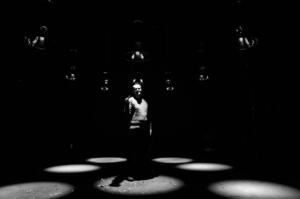
Kushtrim Koliqi. Courtsey of Kushtrim Koliqi.
verity healey: First of all, what drew you to the theatre rather than say film?
Kushtrim Koliqi: Theatre has a certain power that no other medium can have. It has direct contact with the audience and it has live emotions. But there is a narrative in Kosovo at the moment that the theatre is very elitist, so I want my theatre shows to reach those who are not converted to the art form and to challenge them with my plays.
It is about confronting and disturbing and educating people. When I work on Integra’s independent shows or when I work at Kosovo’s National Theatre, for example, we work hard to reach people who wouldn’t normally see these plays about social issues. I believe we are being successful in reaching out to new audiences.
vh: So how do you go about getting these audiences to see your shows?
KK: We target mainstream audiences, as well as the communities we are already working with. We want to develop audiences that come to the theatre but don’t have our values. But in Kosovo, in society and at an institutional level, there are no audience development strategies. It’s a new concept here. So we are trying to develop some policies to attract the mainstream by using different platforms – we go into schools, institutions, universities, and ones not related to the arts for example. And we want to deconstruct this narrative that theatre is an elitist medium. To do this, you have to create a narrative about your show and it will bring people. Take Father and Father for example – when we published the dates for the performances we sold all the tickets in two days. And we were targeting victims’ groups.
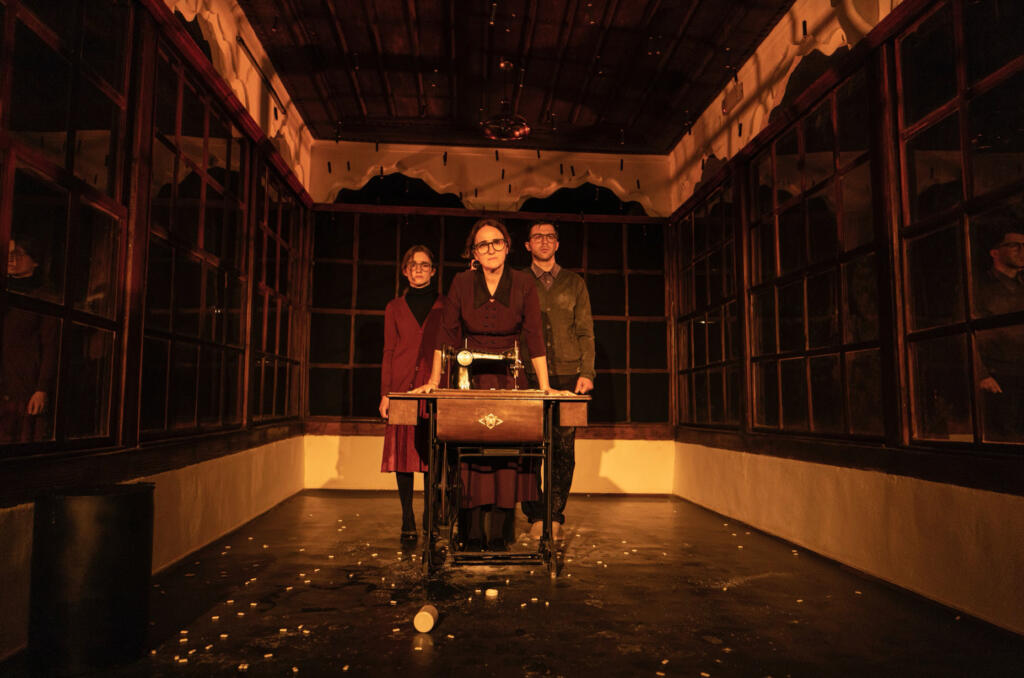
Father and Father. Actors: Kosovare Krasniqi, Ilire Vinca, Bujar Ahmeti. PC: Sovran Nrecaj.
vh: Can you explain how you got more mainstream audiences to see Father and Father then?
KK: On Facebook we targeted mainly people above 30, and on Instagram those above 16. But with Stiffler we had to do something different. It was tailored for the mainstream media and then we went to universities and colleges in the private sector. It is important to get to people outside the bubble.
vh: So is audience development a kind of activism on your part?
KK: No, it is a mission, we are doing it for the audience.
vh: I want to turn to Integra for a moment. The organization produced Stiffler, Father and Father. Can you explain to readers who might not know, a bit more about Integra?
KK: Integra is an organization focused on human rights, on transitional justice and dealing with the past. We are dealing with the legacies of the sufferings from the war and the conflict and the long-lasting never-ending hatred between two nations, Kosovo and Serbia. We are also dealing with the communist system. It can be disturbing and hardcore. Most of our is work related to the recent conflict, for example, we recently published a memory book with testimonies from political prisoners at Goli Otok, a prison which was famous in Yugoslavia.
vh: Integra’s work has to impact your work as a theatre director in terms of underpinning philosophies and even aesthetics.
KK: Yes, definitely. For Stiffler, Integra did advocacy work with sex workers in Kosovo. In fact, we were doing advocacy work first and as I was really touched by their issues, I decided we must do something. So I met with Doruntina Basha, a playwright from Prishtina. I told Dori that this is a super marginalized community. Usually in Kosovo marginalized communities are related to ethnic Serbs or other minorities or the gay community and so they are naturally more vocal. But all sex workers in Kosovo are criminalized so much that no one cares about them. During our research, we realized that they aren’t aware that they do have rights, even though they are criminalized. We also decided to focus on Kosovo sex workers, because say ten years ago, most of the sex workers were coming from Eastern Europe, now 95% of Kosovo sex workers are Kosovo Albanians. So the market has changed and unfortunately, there are cheap sex worker services where women are humiliated by absolutely everyone. When we decided to do this play people were surprised that we were thinking about this social group. But we believe that even if sex workers are criminalized by law they need to have access to proper health services, security services, and the family domain.
vh: I remember Stiffler included scenes with testimonies.
KK: They were fictional testimonies mixed in with Hava’s (the sex worker) episodic narrative. We discussed with Dori that we wanted to explore the health system, the security system, the patriarchal family domain and conditions at the morgue. It is based on the evidence and testimonies we gathered, trying to get the specifics of what it is like to be a sex worker in Kosovo.
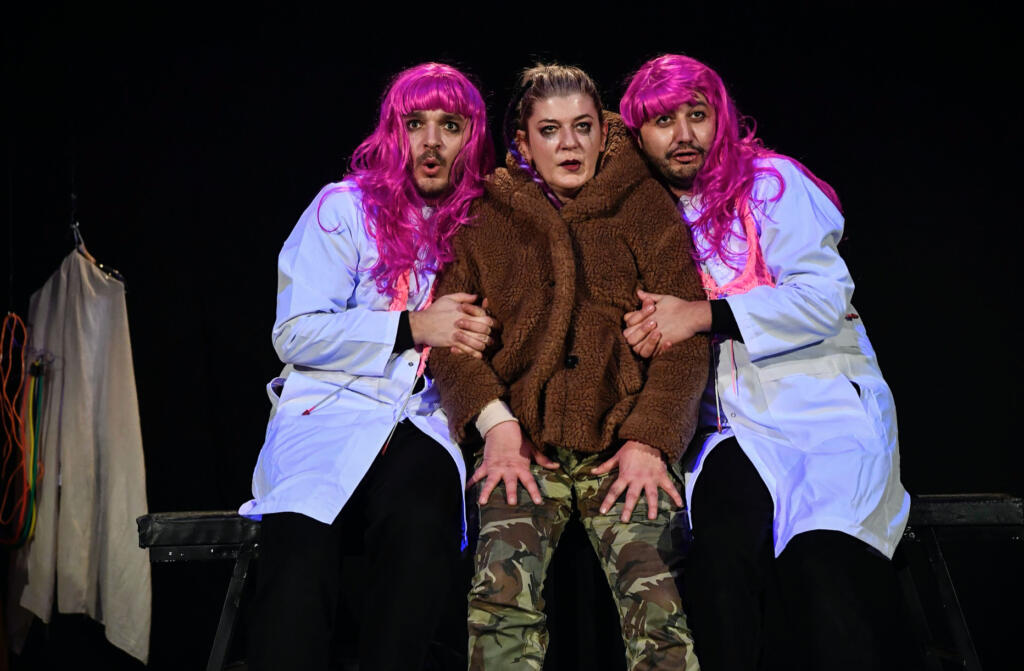
Stiffler. Actors: Adrian Morina, Rebeka Qena, Armend Smajili. PC: Sovran Nrecaj.
vh: Will Integra continue to work with this community post Stiffler?
KK: Yes, of course, we are still working with the organizations we are supporting. We are part of a group of organizations working with marginalized groups which include MSM (men who have sex with men) sex workers, drug users and people living with HIV.
People from the Ministry of Justice and health workers from other organizations came to see Stiffler actually and their reaction was “are we really like this?” and I am saying, “yes this is you.” So they know that we are doing this advocacy with these groups and sometimes we have this odd relationship with these politicians and health workers, because they know our position when it comes to sex workers and that we intend to decriminalize them because it also helps to fight human trafficking and patriarchy for example.
When we started on Stiffler I told the actors and Dori that we are going to be brutal towards everyone. We will not give amnesty to anyone in terms of how they treat sex workers. We had a debate during the rehearsals because the actors were saying that we need some kind of hope in the play, but I said that Kosovo men and Kosovo society do not deserve any redemption over this issue. Even at the end of the play, if you remember, the male staff at the morgue do wait longer than usual for someone to claim Hava’s body, which can show them in a more positive light. But I decided that we should make Hava pregnant and use that as the reason why they become softer towards her. So it is still patriarchal. The main agenda with Stiffler was to disturb people to the limits. I believe that we have achieved that.
vh: Would you classify yourself as a political theatre maker?
KK: We are political beings, all of us. Even if you do a cheesy comedy you cannot detach yourself from society. I am an engaged person and I am radical about the things I care about.
vh: How have your challenges changed as a theatremaker and activist since you have been working for more than the last decade?
KK: At Integra, we actually don’t do theatre plays very often. But I am happy now that there are more independent organizations doing theatre even though there are huge infrastructural, political and financial challenges. Independent theatre is far stronger than theatre at Dodona Puppet Theatre (a city-state-funded theatre) for example, even though I am chair of the board at Dodona.
vh: When I first came here two years ago there was funding available for independent theatre on a project-by-project basis but at the time theatre artists couldn’t access it and others were getting that money instead. Has anything changed?
KK: The support for the independent scene has always been chaotic. Sometimes we got some money from the state and it was hard to survive independently on a project-by-project basis. Now it is a little better, we have a new culture minister (Hajrulla Çeku) and a new government and a scheme which will support programming for a year. However, there are still problems with accessing the money and it still seems chaotic. We are now proposing that the funding can be secured for the long term. However, there is hope and there are some indications that some established institutions will have some support from the government.
vh: So the Kosovo government aren’t thinking ahead, so you can’t plan with any vision?
KK: Of course. But this is also the first time that they have given funding for a year at least and now some organizations have more money than ever before. It’s 80,00 or so, rather than a few thousand let’s say. There are some complications, but the money will comes, it is a pilot. The initial idea is good and let’s hope it will continue. The new government can’t change everything straight away.
vh: How do the challenges that Kosovo faces as a nation building bridges with countries such as Serbia affect you as a theatremaker?
KK: The main communication with Serbia is through artists. It used to be better, but now it is worse and there are very few windows that are open through which to communicate because our politicians and unfortunately the international community aren’t focused on people anymore but on policies and getting a deal. Even though Kosovo and Serbia are neighbors communities are still insulated from each other. There is only one cultural festival we do with Serbia now, which Integra founded, which is Miredita- Dobar Dan which exchanges productions between the two countries each year and takes place in Belgrade.
vh: I was reading in the media that a Serbian minister visited Kosovo in August ‘22 for the first time in a long time. But what you are saying is that even if the politicians are talking to each other, communities of people aren’t?
KK: Even politicians have hardcore relations. The minister only came to visit the Serbs. It is a pity because there is a lot of propaganda about the war in these societies which are full of dogma. When we go to Serbia I can see the reaction from some people in the media when they learn the actual truth about something which is based on evidence rather than a fairytale. The Serbian government owns the media there, so they own the mindset of the people. In Kosovo, there is a different problem, a historical problem. In different ways, we have had one century of Serbian oppression and there is an inclination to generalize the guilt and we have to be against that.
vh: So does it make your job harder because of this media response?
KK: Harder because we cannot compare the power that these organizations have with what we have but it is for this reason that we are challenging them. So at the end of Father and Father, the show about people missing from the war, we gave out these squares of material with the number 1600. It represents 1600 still missing, still unaccounted for but we were clear that the number includes Serbs and Roma people as well. Because unfortunately when politicians on both sides talk about the war they spin it in a very biased way. So here in Kosovo, most of the population thinks that only the Kosovo Albanians suffered.
vh: Let’s talk about Father and Father. I think I have seen three shows of yours, I am my own wife (2020) and Father & Father and Stiffler this time around. Aesthetically they are all very different. And Father & Father was a surprise, in terms of how it was staged and also in terms of how it was written by Jeton (Neziraj), because there was more characterization and more feelings present than I am used to seeing in his work. But can you first of all explain why you chose the Ethnographic Museum as a venue? And it was a tight bay window staging, like a box, a prison, very site-specific, could you explain your choices?
KK: Integra commissioned Jeton to write this play. I was clear about what I wanted from him and the topic. It was a great professional relationship. From the beginning, I knew needed an intimate playing space and I also understand the impact I wanted on the audience. I knew I wanted it to be staged outside the theatre. When I initially talked to the team, including the actors, they were skeptical. But the main reasons for staging it there were mainly because of the intimacy the venue allows. I told the actors I need the audience to be able to see their eyes opening and closing, which is an important part of the show.
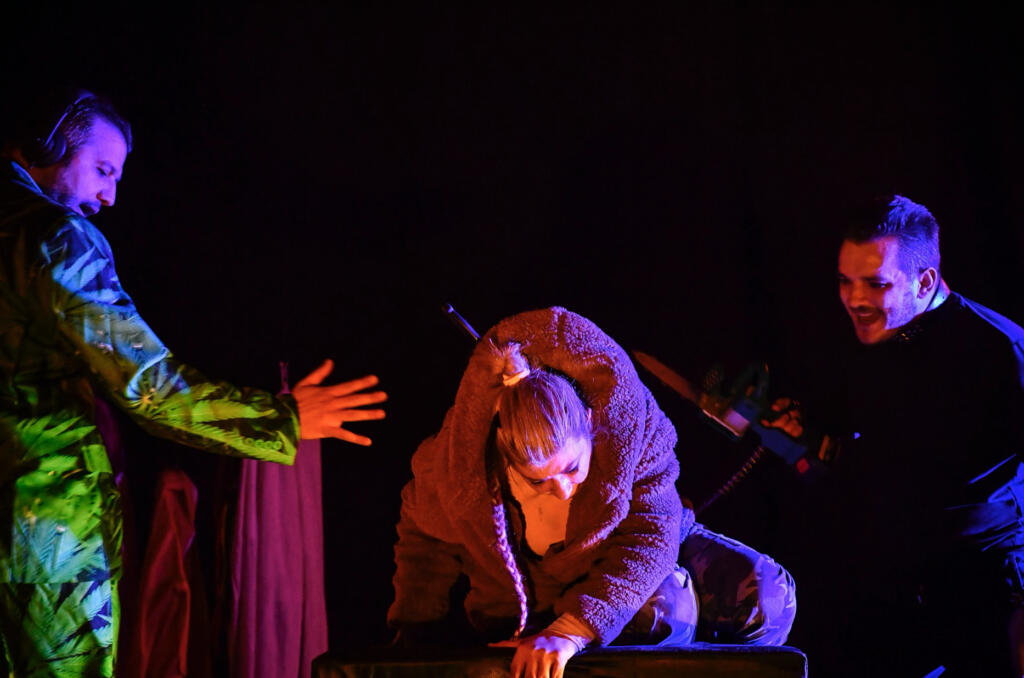
Stiffler. Actors: Adrian Morina, Rebeka Qena, Armend Smajili. PC: Sovran Nrecaj.
vh: Watching it was an intense experience. It was interesting because at first, you thought you were watching a 4th wall naturalistic drama and then it became clear it wasn’t that because there were obvious moments when the actors looked directly into the eyes of the audience and made them complicit in something.
KK: I said to the actors all my director interventions need to be subtle, even with lights and the music etc so the emotions could come out. And one of the first discussions I had with the cast was about finding a daily routine that the family have because of how they are living with the false notion of the father still living there (when he isn’t, he is missing) and then the daughter blows everything up.
vh: I felt you were really trying to get a sense of what it was like for the mother who is pretending that the father is still living with them and is not missing. It is clear quite early that the father’s presence onstage is not real, but even though I knew in my head that that was the case, I was also wanting to believe for the mother’s sake that he was there.
KK: Some audience members who came to see the show weren’t aware of what it was really about. So that reaction is what I wanted. After 70% of the show, they understand that he is missing and that the daughter is rebelling against the mother because she is imposing this construction upon her and her life. When the father and daughter interact onstage they have no eye contact because she does not believe he exists. So the father is missing, and the mother is traumatized and to survive creates this false notion that he is still living with them.
vh: Towards the end, the daughter starts to understand that the mother is doing this for survival, even though it negatively impacts her. Would you say the daughter has more empathy for her in the end?
KK: The daughter has a narrative climax and it is when she confronts her mother. That was her aim, to confront her and tell her that she isn’t like her and can’t live like this. When she gets married it is a way out but at the same time, she feels for her mother. Then they finally talk about the war and the audience realise that the daughter never knew her father, she was born after he went missing.
vh: When the daughter prepares to get married, you have the mother facing the audience sewing at her machine, then the father standing immediately behind her with his back to her and the audience but in front of the daughter and towering over her as she changes into her black wedding dress. It struck me as a central image and turning point in the show.
KK: It is immediately after the daughter and the mother confront each other. Basically, I created that image to represent the wall that the daughter is overcoming, it is an emotional wall. The black wedding dress means that the daughter is not happy to leave the mother but she has to all the same. You know how it is, how you can love someone so much pathologically but the circumstances are blowing you up inside.
vh: Yes, that really comes across. Can you talk about the audience’s responses to the show?
KK: They have been very emotional, very powerful. More than half the audience cries. When it previewed someone fainted. But this was our agenda because this show focused on the 1600 missing people from the war. But also, a German colleague of yours said that in Germany it could relate to WW2 as well. But it also relates to people you just miss. The show communicates on a universal level to people who are not ready to accept that he or she has lost someone who was very important in their life.
vh: To conclude our interview I would love to chat about Stiffler, your show about sex workers some more. For context, for the readers, the play concerns Hava, who is stabbed in the back by a client (she literally has a knife in her back all the way through the play) and it charts how she subsequently tries and fails to get medical attention, support and justice from the healthcare system, the police, and her family. Can you describe your research process? How close to the sex workers was Dori for example?
KK: The whole process took about a year. Some sex workers were also consulted with. Dori met with organizations working with the sex workers. Hava herself is based on a mix of people. When you read the play, you also realize that there are more characters actually, at least it implies a larger cast. But I decided to do a show with only three people so that the narrative focus would be on Hava and her journey. This was my choice.
vh: You have two male actors playing two female nurses, so in drag. Can you explain your ideas behind this choice?
KK: In the play, the nurse is only one female character. I decided to split it into two men playing women to emphasize the hard-core humiliation that is dolled out to sex workers by women because sometimes women can be worse than men towards each other because they too have this patriarchal mindset. There is still this philosophy in Kosovo that women feel they need to be beaten by their husband otherwise he is not a man, he is not their husband. It is problematic for me, I mean I have friends whose boyfriends or partners won’t let them go out clubbing for example. So what I am trying to say here with this particular choice is that women help boost and maintain patriarchal attitudes.
vh: It seems to me that Hava starts out quite strong at the beginning, or at least, she is stronger obviously than she is at the end.
KK: It is the last six hours of Hava’s life, condensed into just over an hour. She is in survival mode the whole time.
vh: There are moments where Hava retires to the front of the stage, with her back to the audience to watch the other two male characters partake in what seems to me longer and longer costume changes. It felt to me that this implied that she was becoming increasingly sidelined in her own story by the institutions and social bodies who were rejecting her.
KK: We wanted to give the actress Rebecca a bit of time to breathe because it is very tough for her to play this character taking her last breath. It also gave the audience time to breathe and reflect.
vh: It might seem an obvious thing to say and ask, but you’re a man. So why did you decide to direct this show, rather than getting a woman to do it?
KK: I really believe that women’s rights cannot be monopolized. It is normal for example, for a woman to fight for women’s rights in Kosovo, it is rare that a man fights for a woman. In Kosovo men are bulls**t, we are like criminals. This is who we are (in terms of attitudes to women and sex workers) and I am not going to compromise on this. Of course, there are good men around, but we are the exceptions. I am really happy I directed the show. And actually, the Ministry of Justice got in touch with us because they want this show to be part of their program of sixteen days of activism against gender-based violence, which will run from 25th Nov to 10th December in Kosovo. So Stiffler was performed on 1st December.
This post was written by the author in their personal capacity.The opinions expressed in this article are the author’s own and do not reflect the view of The Theatre Times, their staff or collaborators.
This post was written by Verity Healey.
The views expressed here belong to the author and do not necessarily reflect our views and opinions.

